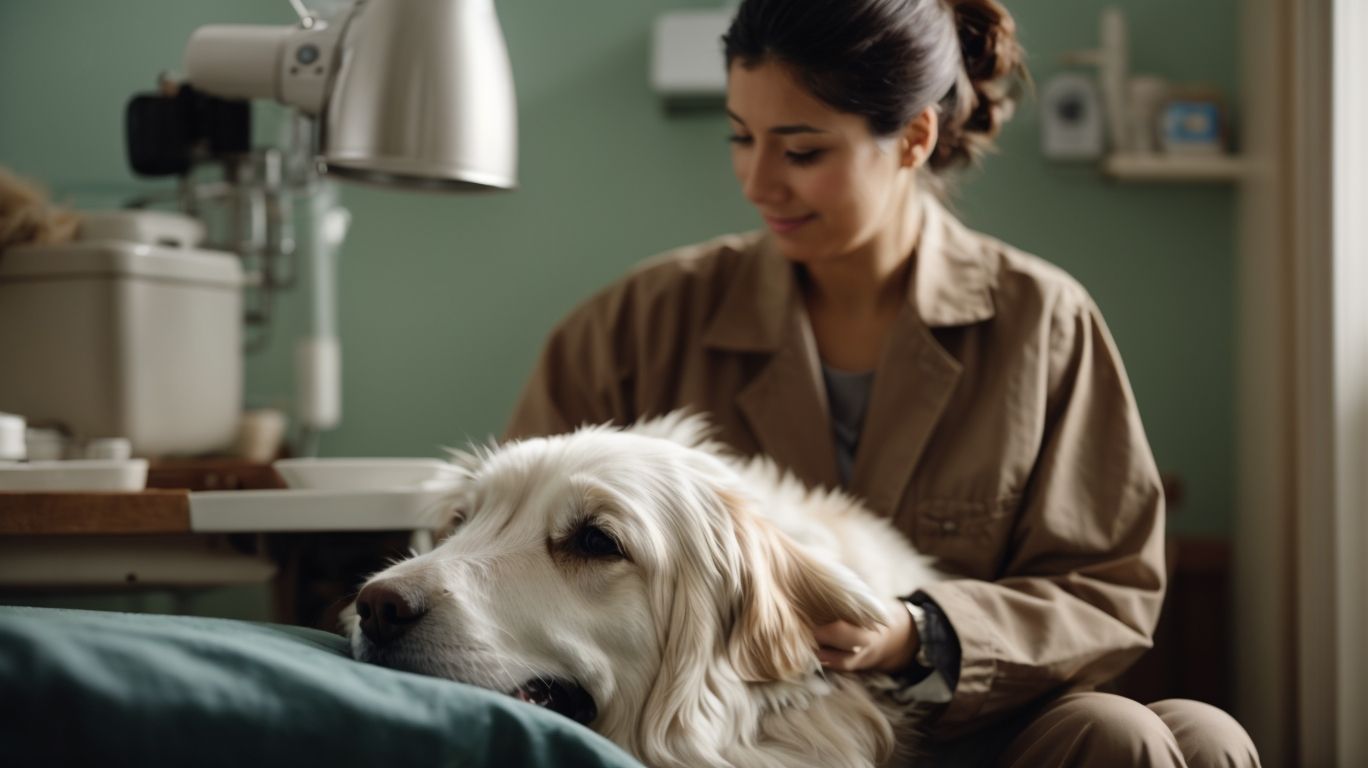
Managing Diabetes in Senior Dogs: Symptoms, Diet, and Treatment
As our beloved furry friends age, they become more susceptible to various health issues, including diabetes. In this article, we will explore the symptoms, diagnosis, and treatment options for diabetes in senior dogs.
From increased thirst and urination to the best diet and medication options, we will cover everything you need to know to help your senior dog manage diabetes. Whether it’s insulin injections or a controlled feeding schedule, we have you covered with the best ways to keep your senior dog healthy and happy.
What Is Diabetes in Senior Dogs?
Managing diabetes in senior dogs involves the careful regulation of blood sugar levels and the overall management of the disease, which can significantly impact the health and well-being of aging pets.
As dogs age, they become more prone to developing diabetes, a condition characterized by the body’s inability to regulate blood sugar properly.
Common symptoms of diabetes in dogs include increased thirst, frequent urination, weight loss, and lethargy. If left untreated, diabetes can lead to severe complications such as cataracts, kidney problems, and nerve damage.
Therefore, it is crucial for pet owners to work closely with veterinarians to create an effective management plan, which often includes dietary changes, regular exercise, and insulin therapy to ensure the well-being of their senior dogs.
What Are the Symptoms of Diabetes in Senior Dogs?
Recognizing the symptoms of diabetes in senior dogs is crucial for early intervention and effective disease management. This can greatly influence the overall health and well-being of aging canines.
Common symptoms of diabetes in senior dogs include increased thirst, frequent urination, weight loss despite a good appetite, lethargy, recurrent infections, and vision problems. These signs can often be mistaken for normal aging, but early detection through regular veterinary check-ups and blood tests is essential.
With prompt diagnosis, dietary management, medication, and exercise, senior dogs with diabetes can lead fulfilling lives and minimize the risk of complications associated with the disease.
Increased Thirst and Urination
One of the primary symptoms of diabetes in senior dogs is increased thirst and urination, which necessitates close monitoring and can indicate the progression of the disease.
This symptom is often a result of the body’s attempt to eliminate excess sugar through urine, leading to increased urination and subsequent dehydration, triggering the urge to drink more water.
Regular observation of a senior dog’s water intake and frequency of urination can provide valuable insights into the management of diabetes and the effectiveness of treatment. Timely identification and management of these symptoms are crucial in preventing potential complications associated with diabetes in senior dogs.
Weight Loss
Unexplained weight loss is a common symptom of diabetes in senior dogs, indicating potential health issues and disease progression that require close health monitoring.
It’s vital to note that weight loss in dogs with diabetes can be a sign of the body’s inability to properly utilize glucose for energy, leading to muscle and fat breakdown. This can result in decreased body condition and strength, making the dog more susceptible to other health issues.
As the condition progresses, it may lead to a weakened immune system and slow wound healing, placing the dog at higher risk for infections and complications. Regular monitoring of weight and overall health is crucial to managing diabetes in senior dogs and preventing further health deterioration.
Lethargy
Lethargy and decreased energy levels are notable symptoms of diabetes in senior dogs, indicating potential disease progression and the need for health monitoring and improvement.
Diabetes can greatly affect a dog’s quality of life and may indicate the presence of complications. It’s important for senior dogs with diabetes to be closely monitored for any changes in their energy levels.
Working with a veterinarian to create a personalized care plan is essential for addressing the specific needs of these dogs. By regularly checking their pet’s health and making necessary adjustments, owners can help improve the overall well-being and longevity of their beloved furry companions.
Decreased Appetite
Decreased appetite in senior dogs with diabetes can indicate potential disease progression and the need for health monitoring and improvement, as it affects their overall well-being.
This symptom can lead to weight loss, weakness, and poor regulation of blood sugar levels, which could exacerbate the condition.
Therefore, attentive monitoring and efforts to stimulate their appetite are crucial in managing their diabetes effectively. Encouraging regular exercise and providing a balanced diet can help improve their appetite and maintain a healthy weight, which in turn supports their overall health and the management of their diabetes.
How Is Diabetes Diagnosed in Senior Dogs?
Diagnosing diabetes in senior dogs involves comprehensive laboratory tests and close monitoring of disease symptoms to determine the disease progression and the overall health status of aging canines.
Through blood tests, including glucose and fructosamine levels, veterinarians can assess the dog’s blood sugar control.
The presence of symptoms like excessive thirst, frequent urination, unexplained weight loss, and lethargy can aid in diagnosing diabetes.
Health monitoring also plays a crucial role in managing the disease and preventing complications.
Pet owners should routinely monitor their senior dogs for any changes in their condition, such as increased water intake or changes in appetite, and report these to the veterinarian for further evaluation.
What Is the Best Diet for Senior Dogs with Diabetes?
The best diet for senior dogs with diabetes typically includes high-fiber content and low-glycemic index foods to support their health and effectively manage the disease, in line with veterinary recommendations for senior dog care.
Maintaining stable blood sugar levels and preventing complications associated with diabetes in senior dogs requires following specific dietary requirements. This includes incorporating high-fiber foods to regulate digestion and assist in weight management, as well as low-glycemic index foods to prevent rapid spikes in blood sugar levels. It’s important to consult a veterinarian for personalized dietary recommendations, as each dog’s needs may vary.
Prioritizing nutrient-dense and balanced meals is crucial for ensuring adequate nutrition and overall well-being for senior dogs with diabetes.
High-Quality Protein
Including high-quality protein in the diet of senior dogs with diabetes is essential for their overall health and well-being. This emphasizes the importance of proper pet nutrition and disease control.
This is particularly significant as senior dogs with diabetes require a carefully balanced diet to manage their condition effectively.
High-quality protein sources, such as lean meats and fish, provide essential amino acids that support muscle mass and aid in regulating blood sugar levels.
Ensuring the right balance of protein, carbohydrates, and fats in their diet can also help in maintaining a healthy weight, which is crucial for managing diabetes in senior dogs.
Proper portion control is essential to prevent overeating and weight gain, which can exacerbate their condition.
Low Carbohydrate Content
A diet with low carbohydrate content is beneficial for senior dogs with diabetes, supporting their health and aligning with the specific dietary requirements for disease management and treatment.
This type of diet can help regulate blood sugar levels and reduce the reliance on insulin injections. It can aid in weight management, as excess weight can worsen diabetes in dogs.
Low-carb diets also promote a healthy balance of nutrients, ensuring that senior dogs receive essential vitamins and minerals without the risk of blood sugar spikes. Limiting carbohydrates can alleviate the strain on the pancreas, which is especially important for aging dogs with diabetes.
Adequate Fiber
Ensuring an adequate fiber intake in the diet of senior dogs with diabetes is essential for supporting their digestive health and overall disease management, in line with optimal pet nutrition and canine care.
In addition to promoting feelings of fullness and aiding in weight management for diabetic dogs, a high-fiber diet can also help regulate blood sugar levels. This is especially beneficial for senior dogs who may be more prone to constipation and diarrhea, as fiber can alleviate these common issues and improve their overall comfort and well-being.
By including fiber-rich foods in their meals, pet owners can take a proactive approach to managing their senior dog’s diabetes and ensuring they have a happy and healthy life.
Controlled Feeding Schedule
Implementing a controlled feeding schedule for senior dogs with diabetes is vital for their overall health and disease management. This requires close health monitoring and meticulous canine care and management.
This approach ensures that the diabetic senior dogs receive the right amount of food at the right times, helping to stabilize their blood sugar levels and prevent unpredictable spikes. A consistent feeding schedule allows for better health monitoring, making it easier to track their response to medications and insulin therapy. It also promotes a sense of routine and stability, which can have a calming effect, especially for diabetic senior dogs who may be struggling with other age-related health concerns.
In addition, portion control is crucial in managing their weight, preventing obesity and related complications.
What Are the Treatment Options for Diabetes in Senior Dogs?
The treatment options for diabetes in senior dogs encompass insulin administration, medication, and holistic approaches to promote canine wellness and effectively manage the disease under veterinary consultation and recommendations.
Insulin administration is a common method of managing diabetes in senior dogs. Many pet owners have become adept at administering insulin injections to their furry companions. In addition to insulin, medication such as oral hypoglycemic drugs may be prescribed to help regulate blood sugar levels.
Holistic approaches can also play a significant role in managing diabetes in senior dogs. These may include diet modifications, exercise, and supplements that support overall health and wellbeing. It’s essential for pet owners to work closely with their veterinarian to develop a comprehensive treatment plan tailored to their dog’s specific needs.
Insulin Injections
Insulin injections play a crucial role in regulating the blood glucose levels of senior dogs with diabetes, providing essential health support and effective disease control as part of their overall canine treatment and health maintenance.
Insulin injections are crucial for managing diabetes in senior dogs. They mimic the body’s natural insulin production, maintaining stable blood sugar levels and preventing complications. This promotes overall well-being by reducing organ damage, increasing energy levels, and improving quality of life.
This intervention is a vital part of comprehensive diabetes management in dogs, providing caregivers with a powerful tool to support their beloved pets’ health.
Oral Medications
Oral medications are viable options for disease management in senior dogs with diabetes, providing effective medical management and disease control as part of their comprehensive canine treatment.
Oral medications play a crucial role in regulating blood sugar levels and reducing the reliance on insulin injections. These medications can improve a dog’s quality of life by reducing the frequency and severity of diabetic complications. They also help maintain a stable and consistent glucose level in the body, preventing sudden spikes or drops that can be detrimental to a senior dog’s health. By incorporating oral medications into the overall treatment plan, the overall well-being of senior dogs with diabetes can be significantly impacted.
Diet and Exercise
Diet and exercise are integral components of the treatment plan for senior dogs with diabetes. These contribute to weight management, physical activity, lifestyle adjustments, and overall health improvement as part of their comprehensive canine health care.
Proper nutrition is essential for managing blood sugar levels and preventing complications in diabetic senior dogs. Regular exercise is also crucial as it helps control weight, increases muscle strength, and improves cardiovascular health.
By implementing a balanced diet and suitable exercise routine, senior dogs with diabetes can maintain a healthier lifestyle, enhancing their overall well-being and happiness.
Regular Monitoring and Veterinary Care
Regular monitoring and veterinary care are essential for the comprehensive treatment of senior dogs with diabetes, as they help manage disease progression and ensure optimal canine management and health care under veterinary consultation.
Regular check-ups are crucial for diabetic senior dogs as they allow veterinarians to monitor blood sugar levels, assess treatment effectiveness, and make necessary adjustments. These evaluations also help detect potential complications like diabetic retinopathy or kidney disease early, allowing for timely interventions to maintain overall health. With personalized guidance from veterinarians, pet owners can implement dietary and lifestyle modifications to improve their dog’s well-being.
How Can Diabetes Be Managed in Senior Dogs?
Diabetes in senior dogs can be effectively managed through regular blood sugar monitoring, proper medication administration, consistent diet and exercise, and the attentive management of other health conditions to ensure their overall well-being and disease prevention under comprehensive senior canine management.
Closely monitoring a senior dog’s blood glucose levels is crucial to ensure they remain within the target range. This is because uncontrolled diabetes can lead to serious health complications.
Proper medication administration, such as insulin injections, and a well-balanced diet tailored to their specific nutritional needs can help senior dogs lead a comfortable and active lifestyle. Additionally, incorporating regular exercise into their routine can improve insulin sensitivity and maintain a healthy weight, reducing the risk of diabetic complications.
Regular Blood Sugar Monitoring
Regular blood sugar monitoring is a critical aspect of managing diabetes in senior dogs. It contributes to health monitoring, blood glucose control, and the prevention of disease progression for optimal canine health.
This monitoring allows pet owners and veterinarians to closely track the fluctuations in the dog’s blood sugar levels. It aids in the identification of patterns and trends that can inform treatment adjustments.
By maintaining stable blood glucose levels, potential complications such as cataracts, urinary tract infections, and neuropathy can be minimized. This enhances the overall well-being of the senior dog.
Regular monitoring enables early detection of any deviations, facilitating prompt intervention and preventing adverse effects on the dog’s health.
Proper Medication Administration
Proper medication administration is crucial for managing diabetes in senior dogs. It contributes to effective medical management, health support, and disease prevention as part of their comprehensive canine health care and management.
Stabilizing blood sugar levels and preventing complications, proper medication administration improves the overall quality of life for senior dogs with diabetes. It can alleviate symptoms like excessive thirst, frequent urination, and weight loss, while also supporting the proper functioning of vital organs and reducing the risk of related health issues.
Consistent and accurate medication administration is essential for the well-being and longevity of senior dogs with diabetes. It’s crucial to follow your veterinarian’s instructions carefully to ensure the best possible outcome for your furry friend.
Consistent Diet and Exercise
Maintaining a consistent diet and exercise regimen is essential for managing diabetes in senior dogs. This includes providing a balanced diet tailored to the dog’s specific needs, ensuring proper portion control to regulate blood sugar levels, and incorporating regular physical activity to maintain a healthy weight and enhance insulin sensitivity. These measures contribute to weight management, physical activity, lifestyle adjustments, and overall health improvement for effective disease management and comprehensive canine health and management.
Lifestyle adjustments, such as establishing a routine for feeding and exercise, play a crucial role in managing diabetes in senior dogs. They help to stabilize glucose levels and minimize the risk of complications, supporting overall health improvement. This promotes a sense of well-being and vitality for our beloved senior canine companions.
Managing Other Health Conditions
Managing other health conditions alongside diabetes is essential for the comprehensive disease management and overall well-being of senior dogs. This requires close health monitoring, attentive canine care, and effective disease treatment and management.
The presence of additional health issues, such as arthritis or heart disease, can significantly impact the management of diabetes in senior dogs. These concurrent conditions may influence the choice of medications and treatment plans, while also affecting the overall health and mobility of the canine.
Regular health monitoring becomes even more crucial in such cases, as it allows for timely adjustments in the diabetes management protocol to accommodate the needs arising from the coexisting health conditions.




No Comments